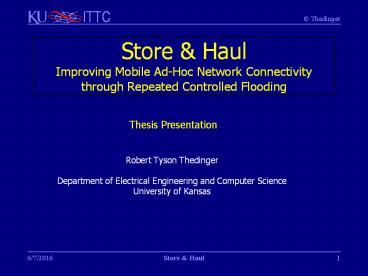Store - PowerPoint PPT Presentation
1 / 34
Title:
Store
Description:
Store & Haul Improving Mobile Ad-Hoc Network Connectivity through Repeated Controlled Flooding Thesis Presentation Robert Tyson Thedinger Department of Electrical ... – PowerPoint PPT presentation
Number of Views:56
Avg rating:3.0/5.0
Title: Store
1
Store HaulImproving Mobile Ad-Hoc Network
Connectivity through Repeated Controlled Flooding
Thesis Presentation
- Robert Tyson Thedinger
- Department of Electrical Engineering and Computer
Science - University of Kansas
2
Store Haul Abstract
- This work investigates the benefits and
drawbacks of repeating controlled flooding at
different intervals in mobile ad hoc networks
(MANETs) to overcome episodic connectivity.
Specifically, the thesis examines the
efficiencies in repeating transmissions by
quantifying the packet delivery ratio (PDR) and
recording the resulting delays in different types
of MANET scenarios. These scenarios mainly focus
on partitions within the simulated networks by
varying node density and mobility. The nodes
store transmitted data and haul it across the
MANET in the hope that it will come in range of
the destination. A customized version of Network
Simulator 2 (ns-2) is used to create the
simulations. A qualitative analysis follows and
conclusions are drawn as to what types of
scenarios benefit or suffer from increased
transmissions at varied time intervals.
3
Store HaulIntroduction
- Background
- SH with RCF
- Simulations
- Analysis
- Conclusions
- Questions
6/7/2016
3
Store Haul
4
Store HaulBackground
- Background
- Controlled Flooding
- Problems with flooding
- Epidemic
- SH with RCF
- Simulations
- Analysis
- Conclusions
- Questions
6/7/2016
4
Store Haul
5
Store HaulBackground
- Background
- Controlled Flooding
- MANETs
- Common Routing Protocols
6/7/2016
5
Store Haul
6
Store HaulBackground
- DTNs
- IPN
- Epidemic
- Message Ferrying
- SCF
6/7/2016
6
Store Haul
7
Store Haul Controlled Flooding
- Controlled Flooding
A
B
6/7/2016
7
Store Haul
8
Store Haul Controlled Flooding
- Controlled Flooding - Problems
A
B
Node Density Decreased More Partitioned Network
6/7/2016
8
Store Haul
9
Store HaulEpidemic
- Epidemic
A
B
6/7/2016
9
Store Haul
10
Store HaulSH with RCF
- Background
- SH with RCF
- Simulations
- Analysis
- Conclusions
- Questions
6/7/2016
10
Store Haul
11
Store Haul SH with RCF
- SH with RCF
- Take SH from Epidemic
- Do not store messages permanently in memory
- Repeat the Controlled Flooding
6/7/2016
11
Store Haul
12
Store Haul SH with RCF
- Flooding Problems (revisited)
A
B
6/7/2016
12
Store Haul
13
Store Haul SH with RCF
- SH with RCF
A
B
6/7/2016
13
Store Haul
14
Store HaulSH with RCF
- More SH with RCF
A
B
6/7/2016
14
Store Haul
15
Store Haul SH with RCF
Stop
Stop
Stop
Drop Packet
Drop Packet
Fwd up stack
Yes
Yes
Yes
Already Recvd?
Destination?
n 0?
Start
Recv Packet
Repeat Tx (n-1)
n total number of transmissions tD interval
between tranmissions (assumes ngt1)
Wait Interval tD
6/7/2016
15
Store Haul
16
Store Haul SH with RCF
- Considerations
- Node Speed
- Node Density
- Simulation Variables
- Network Density (P)
- Number of Transmissions (n)
- Interval Between Transmissions (?t)
6/7/2016
16
Store Haul
17
Store HaulSimulations
- Background
- SH with RCF
- Simulations
- Analysis
- Conclusions
- Questions
6/7/2016
17
Store Haul
18
Store HaulSimulations
- Simulations
- ns-2
- Trace Files
- ns-2 Modifications
6/7/2016
18
Store Haul
19
Store HaulSimulations
- Simulation Parameters
Parameter Value
_
Routing
SH with RCF
Area
1000m x 1000m
Num of nodes
30
Simulation time
1000 s
MAC type
802.11
Mobility model
Random Waypoint
Bandwidth
54Mbps
Antenna direction
Omni
6/7/2016
19
Store Haul
20
Store HaulSimulations
- Simulation Scenarios
Variable
Description Possible
Values _
n
Number of Transmissions (total)
2 tx, 3 tx, 5 tx
?t
Interval between Transmissions
1 s, 3 s, 5 s, 10 s 20 s, 40 s, 60 s
1 part (contiguous), 2 part, 3 part, 5 part, 8
part, 10 part, 12 part
P
Average Number of Partitions
6/7/2016
20
Store Haul
21
Store HaulAnalysis
- Background
- SH with RCF
- Simulations
- Analysis
- Conclusions
- Questions
6/7/2016
21
Store Haul
22
Store HaulAnalysis
- Analysis of ?t in 1 s, 3 s, 5 s scenarios (PDR
and Delay)
6/7/2016
22
Store Haul
23
Store HaulAnalysis
- Analysis of n in 2 tx, 3 tx, 5 tx scenarios (PDR
and Delay)
6/7/2016
23
Store Haul
24
Store HaulAnalysis
- Analysis of n in 2 tx, 3 tx, 5 tx scenarios (PDR
and Delay)
6/7/2016
24
Store Haul
25
Store HaulAnalysis
- Analysis of P in 2, 5, 8, and 12 partition
scenarios (PDR and Delay)
6/7/2016
25
Store Haul
26
Store HaulAnalysis
- Analysis of ?t in 1 s, 3 s, 5 s scenarios (PDR
and Delay)
6/7/2016
26
Store Haul
27
Store HaulAnalysis
- Analysis of P in 2, 5, 8, and 12 partition
scenarios (PDR and Delay)
6/7/2016
27
Store Haul
28
Store HaulConclusions
- Background
- SH with RCF
- Simulations
- Analysis
- Conclusions
- Future Work
- Questions
6/7/2016
28
Store Haul
29
Store HaulConclusions
- Conclusions
- New paradigm can bring increased PDR to
segregated MANETs - Simple yet effective
- There are limitations and tradeoffs
6/7/2016
29
Store Haul
30
Store HaulConclusions
- Future Work
- Direct comparison to Epidemic
- More extensive testing to find plateaus and
trends - Real time adjustments
- Different combinations progressive combinations
(1, 3, 5) - Energy consumption
- Security concerns
6/7/2016
30
Store Haul
31
Store HaulQuestions
- Background
- SH with RCF
- Simulations
- Analysis
- Conclusions
- Questions
6/7/2016
31
Store Haul
32
Store Haul Question and Answer
- Questions?
6/7/2016
32
Store Haul
33
Store HaulIntroduction
- Segregated Regions in MANETs
6/7/2016
33
Store Haul
34
Store Haul Introduction
- Segregated Regions in MANETs
6/7/2016
34
Store Haul































